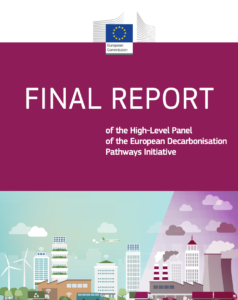When talking about climate solutions, decarbonisation is the new buzzword on the tips of tongues of policymakers. Decarbonisation involves removing or reducing carbon dioxide from energy sources, an objective that researchers consider feasible only if enough public and private funding is mobilised. For Commissioner Carlos Moedas what we need is a “Marshall Plan for Climate Readiness”.
The EU is looking at decarbonisation as a tool with which to create climate stability and a competitive carbon free economy. To accelerate the process the European Commission requested a Final Report of the High Level Panel of the European Decarbonisation Pathways Initiative, seeking to obtain research and innovation strategies as well as a list of priorities for decarbonisation pathways compatible with the Paris Agreement goals.
The Report, published in November 2018, outlines a pathway with which to foster climate change mitigation strategies whilst increasing the competitiveness of the European market and adhering to the commitments made in Paris. It advocates specific areas for European policymakers to focus on, including decarbonising the energy, transport, industrial and agricultural sectors by engaging in a “race to the top” of decarbonisation. This involves prioritising zero-carbon solutions; exploring and developing portfolios for zero-carbon technologies; emphasising system level innovation; and engaging in international cooperation for zero carbon development.
The EU is already taking concrete steps in this direction. In the energy sector, on the 26th March 2019, The European Parliament adopted the clean energy for all Europeans package, consisting of four new laws for the electricity market, including phasing out fossil fuel subsidies by 2025. Furthermore, legislative activity is not just limited to Europe. Russia, the world’s fifth largest emitter, is also considering legislation with which to regulate carbon emissions. A draft bill on greenhouse gas emissions has been submitted and includes: regulatory mechanisms such as a cap and trade system for emission permits and subsidies for companies reducing or capturing carbon emissions. A decisive step in Russia’s efforts to meet their CO2 reduction commitments of 25% from 1990 levels by 2020 and 25-30% from 1990 levels by 2030.
The most important message of the IPCC Special Report is that there is a considerable difference between the impacts of a 1.5 °C and 2.0 °C temperature rise. Climate action ambition must therefore step up and prioritize zero-carbon solutions that have the potential to be developed and deployed within the 2050 timeframe and keep temperature increases as low as possible. Although time is short, initiatives that move the global economy towards decarbonisation bring hope that there is still a chance of making human activities less impactful.
Read the Final Report.






